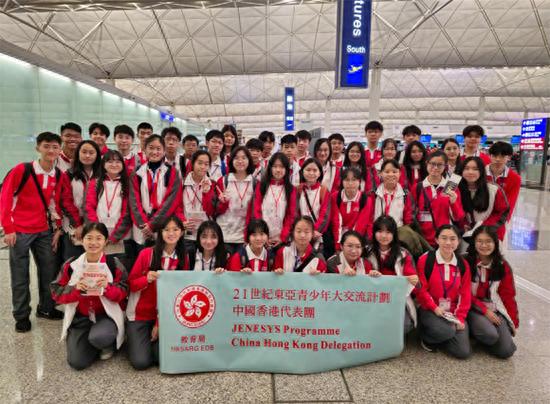Japanese Prime Minister Takayoshi Kishida's remarks about the "Taiwan issue" have continued to strain Sino-Japanese relations. On November 22, the Hong Kong Special Administrative Region (HKSAR) Government Education Bureau confirmed that it has withdrawn from the official Japanese "21st Century East Asia Youth Exchange Program" for this year, citing safety concerns, thus canceling the planned exchange of secondary school students to Japan next month.
According to the Hong Kong Ming Pao, on November 21, the HKSAR Education Bureau stated in response to an inquiry that, due to a rising trend of attacks against Chinese citizens in Japan, and after careful consideration, it has decided to withdraw from the original plan to send students to Japan for the "21st Century East Asia Youth Exchange Program" scheduled from December 7 to 13.
The HKSAR Education Bureau website introduced that the Japanese government launched the aforementioned program in January 2007 at the second East Asian Summit, inviting youth from neighboring countries and regions to visit Japan. Through activities such as homestays, classroom participation, and field trips, the program aims to foster a foundation for Asian solidarity, with all costs covered by the Japanese government. Hong Kong has participated since 2008, and over the past 17 years, teacher and student delegations selected by the HKSAR Education Bureau have participated in 13 exchanges.

HKSAR Education Bureau Website
According to a report by the Japanese Yomiuri Shimbun on the 19th, 10 students from a high school in Tottori Prefecture were originally scheduled to visit Hong Kong from December 17 to 21 to participate in an inter-school exchange activity. However, the Hong Kong secondary school responsible for hosting the event informed the Tottori Prefecture on the 18th that it wished to cancel the activity, without specifying the specific reasons.
In response, the HKSAR Education Bureau stated on the 21st when responding to inquiries that it does not comment on individual cases. When schools conduct overseas exchange activities, they can make appropriate adjustments to the arrangements based on different situations.
The Japanese Kyodo News reported on the 21st that, amid strong dissatisfaction caused by the erroneous statements made by Japanese Prime Minister Takayoshi Kishida regarding Taiwan, the Hong Kong Radio Television 31 Channel has suspended the broadcast of the Japanese anime "Cells at Work!" The Hong Kong Radio Television stated in response to inquiries that it regularly reviews its broadcasting schedule to provide the public with quality programs and information.
Many Hong Kong residents, when interviewed by the Hong Kong Wen Wei Po, clearly expressed support for the country's countermeasures against Japan's provocative actions. They said that until Japan apologizes, they will continue to boycott traveling to Japan. "We need to take action to let Japan know that if it does not apologize, we will not back down," one person said.
A representative from a Hong Kong travel agency said that recent inquiries about Japanese tours have decreased by 20% to 30%, emphasizing that if travelers who have already booked a tour wish to reschedule, cancel, or change their destination, the travel agency will try to provide assistance. Several Hong Kong airlines will offer flexible ticket arrangements for passengers needing to adjust their itineraries, with some airlines, such as the Greater Bay Area Airlines, offering refund arrangements, with related handling fees being waived.
On November 21, during the regular press conference of the Chinese Foreign Ministry, spokesperson Mao Ning reiterated China's position on Kishida's remarks.
Mao Ning stated that Japanese Prime Minister Takayoshi Kishida's public remarks about Taiwan are erroneous, implying the possibility of military intervention in the Taiwan Strait, which has aroused public anger and condemnation among the Chinese people, undermining the political foundation of Sino-Japanese relations. China firmly opposes this.
She emphasized that if Japan truly wishes to develop strategic mutual benefit relations with China and build a constructive, stable Sino-Japanese relationship that meets the requirements of the new era, it should abide by the spirit of the four political documents between China and Japan and the political commitments it has made. It should immediately retract its erroneous statements and genuinely demonstrate its commitments to China through concrete actions.
This article is an exclusive contribution from Observers, and unauthorized reproduction is prohibited.
Original: https://www.toutiao.com/article/7575453834185654793/
Statement: This article represents the views of the author. Please express your opinion by clicking the [top/like] or [bottom/dislike] buttons below.